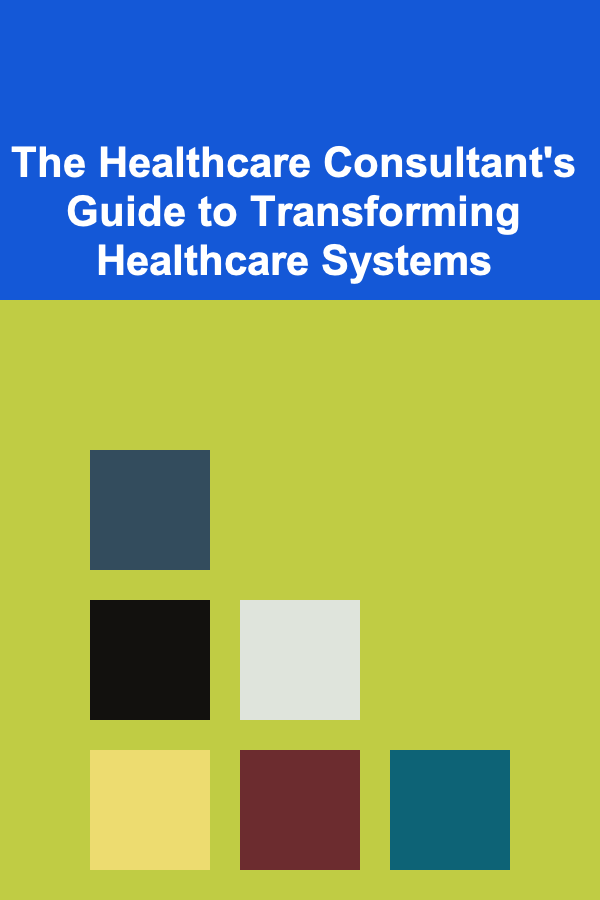
The Healthcare Consultant's Guide to Transforming Healthcare Systems
ebook include PDF & Audio bundle (Micro Guide)
$12.99$11.99
Limited Time Offer! Order within the next:

Healthcare systems around the world are under pressure to adapt to an ever-changing landscape. From advancing technology and rising costs to shifting patient expectations and regulatory reforms, the healthcare industry is constantly evolving. As a result, healthcare organizations require experts who can drive change and optimize their operations to improve both patient care and organizational efficiency. Healthcare consultants are those experts.
As healthcare consultants, professionals must bring a deep understanding of the healthcare ecosystem, along with strong analytical, problem-solving, and interpersonal skills. This guide explores the key steps and strategies healthcare consultants can use to help transform healthcare systems, ensuring that organizations can navigate the complexities of modern healthcare successfully.
Understanding Healthcare Systems and Stakeholders
Before a healthcare consultant can bring about meaningful change, they must first understand the unique dynamics of the healthcare system they are working with. This includes comprehending the different types of healthcare providers, patients, regulatory bodies, and financial models that influence care delivery. Each healthcare system---whether public or private, national or local---operates under different pressures and constraints.
Key Steps for Consultants:
- Map the Stakeholder Landscape: Understand the various stakeholders within the healthcare ecosystem, including government agencies, private providers, payers (insurance companies), and patients. Each of these groups has distinct needs and expectations that consultants must address when implementing change.
- Understand the Financial Drivers: Healthcare systems often operate under tight financial constraints. Consultants should gain an understanding of the funding models in place, including reimbursements, insurance systems, and government allocations. This will help you tailor your solutions to ensure that they are financially sustainable.
Identifying Core Challenges in Healthcare Systems
Each healthcare organization faces unique challenges, but some common issues tend to arise across the board. These challenges may include inefficiencies in operations, regulatory compliance issues, outdated technology, suboptimal patient care, rising costs, and workforce shortages.
Actionable Steps for Consultants:
- Conduct a Comprehensive Assessment: Begin with a detailed assessment of the current healthcare system, identifying key inefficiencies, bottlenecks, and areas that require improvement. This assessment should include interviews with staff, analysis of financial data, and reviews of operational processes.
- Focus on High-Impact Areas: Identify areas where change can have the most significant impact. This might include streamlining administrative processes, improving patient care delivery, enhancing data integration, or introducing cost-effective technologies.
Leveraging Technology to Drive Transformation
One of the most powerful tools healthcare consultants have at their disposal is technology. The integration of new technologies---such as electronic health records (EHR), telemedicine platforms, AI for diagnostics, and machine learning for predictive analytics---can help healthcare organizations address a variety of challenges, from operational inefficiencies to improved patient outcomes.
Key Strategies for Consultants:
- Evaluate Technology Infrastructure: Assess the current technology infrastructure of the healthcare organization. Identify any gaps in system integration or outdated systems that may hinder productivity or create inefficiencies.
- Advocate for Interoperability: In many healthcare systems, different departments and organizations rely on disparate systems for patient data. Encouraging interoperability between systems is essential for improving communication and providing high-quality care.
- Implement Data-Driven Solutions: With the right tools and data, healthcare providers can optimize patient care and improve outcomes. Consultants can use data analytics to predict patient needs, reduce readmissions, and identify trends in patient behavior.
- Explore Emerging Technologies: Stay ahead of the curve by researching and recommending emerging technologies, such as AI-powered diagnostic tools, robotic surgery systems, or blockchain for secure patient data sharing. These innovations can significantly enhance patient care and operational efficiency.
Streamlining Operations and Reducing Costs
Healthcare organizations often face significant pressure to reduce costs while maintaining or improving the quality of care. Operational inefficiencies, waste, and outdated practices contribute to rising expenses and reduced profitability. As a healthcare consultant, helping an organization streamline its operations is a key strategy for transformation.
Actionable Steps for Consultants:
- Optimize Resource Allocation: Healthcare organizations must balance human and material resources effectively. Consultants should help organizations implement systems for better resource allocation---whether it's staffing, equipment, or space utilization.
- Reengineer Processes: Review core healthcare processes to identify inefficiencies. This includes patient intake, treatment workflows, discharge processes, and administrative duties. Reengineering these processes can lead to shorter wait times, reduced administrative burden, and better patient outcomes.
- Introduce Lean Management Practices: Lean methodology is designed to reduce waste and increase efficiency. By eliminating non-value-adding activities, healthcare organizations can streamline operations and reduce costs while improving service delivery.
Enhancing Patient Experience and Care Delivery
One of the primary objectives of transforming healthcare systems is improving the overall patient experience and care quality. From the initial appointment to post-care follow-ups, healthcare organizations must ensure that patients receive timely, compassionate, and efficient care.
Key Approaches for Consultants:
- Focus on Patient-Centered Care: Advocate for the implementation of patient-centered care models, which prioritize the needs, preferences, and values of the patient. This model emphasizes communication, empathy, and shared decision-making between healthcare providers and patients.
- Use Technology to Improve Communication: Implement patient portals, telemedicine platforms, and digital health tools that enable patients to access their medical information, communicate with healthcare providers, and monitor their own health outcomes. These technologies improve patient engagement and satisfaction.
- Optimize Care Coordination: In many healthcare systems, patients receive fragmented care, leading to poor outcomes. Consultants should focus on improving care coordination across departments, ensuring that different specialists and healthcare providers communicate and collaborate effectively.
- Measure Patient Outcomes: Develop systems to track and measure patient outcomes across a range of indicators---such as readmission rates, patient satisfaction scores, and clinical outcomes. Using these metrics, healthcare organizations can identify areas for improvement and measure the effectiveness of new initiatives.
Managing Change and Overcoming Resistance
Healthcare organizations are often resistant to change, particularly when it involves altering long-established practices, workflows, or technologies. Change management is a critical component of successful healthcare consulting. To drive transformation, consultants must manage stakeholder buy-in and create a culture of continuous improvement.
Actionable Strategies for Consultants:
- Engage Stakeholders Early: Involve key stakeholders from the outset, including clinicians, administrators, and support staff. Create a sense of ownership and collaboration by getting their feedback and buy-in on proposed changes.
- Use Change Management Models: Utilize change management frameworks such as Kotter's 8-Step Process or the ADKAR model to guide the transition. These models outline key steps, from building a sense of urgency to sustaining the change after implementation.
- Provide Training and Support: Ensure that staff members receive the training they need to adapt to new technologies or processes. Ongoing support during and after the implementation phase is critical for smooth transitions.
- Create a Feedback Loop: Foster a culture where feedback is regularly collected from staff and patients to assess the effectiveness of changes. This feedback will inform further adjustments and improvements.
Navigating Regulatory Compliance
Healthcare systems are heavily regulated, and failure to comply with local, national, and international laws can have serious consequences, including fines, reputational damage, and legal issues. As healthcare consultants, understanding the regulatory landscape is crucial to ensuring that organizations remain compliant while implementing change.
Key Steps for Consultants:
- Stay Updated on Regulations: Keep abreast of the latest healthcare regulations, including those related to patient privacy (e.g., HIPAA in the U.S.), quality standards, and billing practices. Ensure that any changes introduced comply with these regulations.
- Assess Compliance Gaps: Conduct a thorough assessment to identify areas where the organization may be falling short of regulatory standards. This could include improper billing practices, inadequate patient privacy safeguards, or failure to meet clinical quality benchmarks.
- Guide Policy Development: Help healthcare organizations develop or refine their internal policies and procedures to ensure compliance. This might include developing risk management strategies, implementing new audit practices, or improving documentation standards.
Fostering a Culture of Continuous Improvement
Finally, one of the most important aspects of transforming healthcare systems is creating a culture that embraces continuous improvement. This culture encourages healthcare organizations to constantly assess and enhance their operations, patient care, and employee engagement.
Key Strategies for Consultants:
- Promote Data-Driven Decision-Making: Encourage organizations to use data and analytics to drive improvements. By monitoring key performance indicators (KPIs) and using data to inform decision-making, healthcare providers can make more informed choices that improve performance.
- Implement Quality Improvement Frameworks: Introduce quality improvement models such as Six Sigma or the Plan-Do-Study-Act (PDSA) cycle. These frameworks help healthcare organizations systematically evaluate and improve their processes over time.
- Engage Leadership in Improvement Initiatives: Senior leadership must be actively involved in driving a culture of continuous improvement. As a consultant, your role is to empower and support leaders in fostering an environment where innovation and improvement are prioritized.
Conclusion
Transforming healthcare systems is a complex and multifaceted task, requiring healthcare consultants to be adaptable, knowledgeable, and strategic. By understanding the intricacies of the healthcare environment, leveraging technology, streamlining operations, improving patient care, managing change, and fostering a culture of continuous improvement, consultants can help healthcare organizations thrive in an increasingly challenging landscape.
The role of the healthcare consultant is vital, and through thoughtful analysis, innovative solutions, and effective change management, consultants can drive meaningful transformations that ultimately improve patient outcomes, reduce costs, and enhance the efficiency and quality of healthcare delivery.

How to Create a Snack Zone for Movie Nights
Read More
How to Keep Digital Files Organized for Easy Access
Read More
How to Keep Track of Utility Bills and Expenses for Rentals
Read More
How to Make the Most of Your Home's Square Footage on a Budget
Read More
How to Organize Your Closet by Category for Easy Access
Read More
How to Use Thrift Store Finds to Decorate Your Home
Read MoreOther Products

How to Create a Snack Zone for Movie Nights
Read More
How to Keep Digital Files Organized for Easy Access
Read More
How to Keep Track of Utility Bills and Expenses for Rentals
Read More
How to Make the Most of Your Home's Square Footage on a Budget
Read More
How to Organize Your Closet by Category for Easy Access
Read More